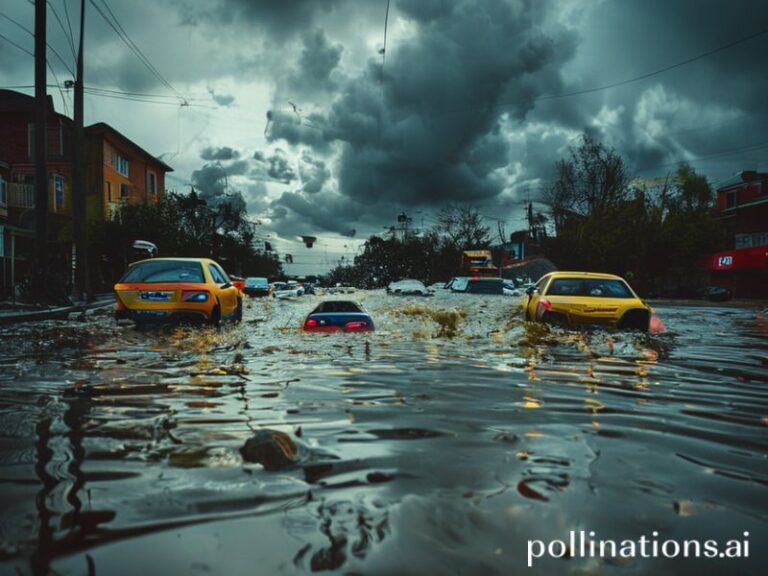How One Canadian Bureaucrat Accidentally Fed the World – and Vanished Before the Credits Rolled
Sarah Campbell and the Quiet Collapse of Borders
Global Dispatch from the Desk of a Jet-Lagged Realist
Sarah Campbell’s name first surfaced last Tuesday in a two-line wire-service squib buried beneath the latest crypto-scandal and a puff piece about Beyoncé’s new yacht. Within 48 hours it had metastasized across five continents, translated into seventeen languages, and trended above both #WorldCupQualifiers and #KPopHaircut. If you blinked, you missed the moment when a 29-year-old civil servant from Winnipeg became the planet’s most unlikely geopolitical hinge.
Campbell—pronounced the same in Swahili and Slovak, which is already suspicious—works for the Global Food Resilience Unit, a bureaucratic oubliette somewhere between the FAO in Rome and the World Bank’s basement. Her job description reads like a haiku nobody asked for: “optimize cross-border grain flows.” Translation: she keeps poor countries from starving while richer countries pretend spreadsheets solve drought. Last Monday she clicked “publish” on a 42-page report titled “Option C: A Loophole Everyone Can Live With,” which quietly recommends that the WTO reclassify humanitarian grain reserves as “pre-emptive retroactive loans.” The memo is so boring that not even trade lawyers finished it, yet by Friday morning it had achieved what decades of UN summits could not: it forced the U.S., China, and the EU to agree—publicly—on the exact same footnote.
The footnote, for those keeping score at home, allows surplus Ukrainian wheat to enter global markets without poking the Russian bear, sidesteps an Egyptian debt default, and gives India enough wiggle room to continue subsidizing its farmers while still sounding austere on the op-ed pages. In short, Campbell drafted the diplomatic equivalent of a fake ID that everyone can use but no one wants to admit exists.
Naturally, the internet reacted with its usual nuance. In Nairobi, #SarahCampbellAppreciationDay trended beside goat-meme GIFs. In Moscow, state TV called her “a sorceress of neo-colonial ledger tricks,” which—let’s be honest—sounds like a killer LinkedIn endorsement. Meanwhile, in Ottawa, opposition MPs demanded to know why a mid-level analyst was setting global food prices instead of elected officials, apparently forgetting that elected officials can’t even set their own Zoom backgrounds.
The broader significance is almost too depressing to type: one competent millennial with a spreadsheet has done more to avert famine than the last three G20 summits combined. Climate scientists warn the Horn of Africa is still four failed rains away from biblical disaster, but thanks to Campbell’s semantic origami, 1.2 million metric tons of grain will now reach Djibouti before the locusts do. That buys the world roughly 90 days—just enough time for the rest of us to rediscover our capacity for self-congratulation and then lose interest again.
International markets responded with the kind of enthusiasm usually reserved for royal weddings or celebrity divorces. Wheat futures dipped, corn held steady, and the Swiss franc—traditional refuge of the terminally anxious—actually weakened against the Canadian dollar. Somewhere in Davos, an oligarch spilled kombucha on his chinchilla overcoat.
Of course, the moment carries the usual asterisks. The agreement expires in 180 days, right after the U.S. midterms and two weeks before India’s general election, so expect a fresh round of performative outrage and strategic amnesia. Also, the fine print allows any signatory to withdraw if “domestic political conditions deteriorate,” a clause so elastic it could justify everything from a prime-ministerial sneeze to an actual coup.
Still, for now, Sarah Campbell remains the most powerful Canadian export since Leonard Cohen. She hasn’t given a single interview, declined all podcast invites, and—according to colleagues—celebrated the breakthrough with a microwaved burrito and an episode of The Great British Bake Off. Somewhere in that lies a moral, if you’re masochistic enough to look: the planet is balanced on the shoulders of people who can’t afford London rent, have no security detail, and still manage to save millions of strangers before the kettle boils.
The rest of us will forget her name by Christmas, of course, but the grain ships are already steaming south, and somewhere on the high seas a captain is humming Leonard Cohen. Which, in this economy, counts as a happy ending.







